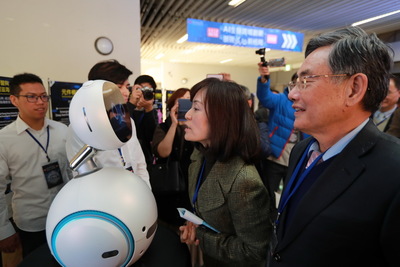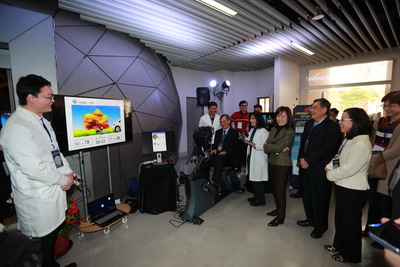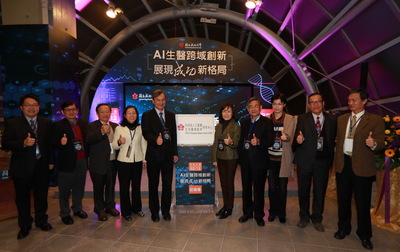AI Biotech and Medical Innovation Research Center in NCKU



The launch of the AI biotech and medical innovation research center by National Cheng Kung University (NCKU) on February 12, 2018 declares a new epoch, ushering in the advent of artificial intelligence technologies and medical innovation research and industrialization in Tainan. AI achievements attained by long-term collaborative endeavors by College of Electrical Engineering and Computer Science (EECS), College of Engineering, College of Medicine, and College of Bioscience & Biotechnology were all exhibited at the venue, including an automated carer and companion for diabetes patients, smart fitness equipment that accommodates the specific needs of elderly residents in community homes, and interactive virtual reality technology that enables long-distance care.
The automated carer is capable of simulating human speech. Prof. Jung-Hsien Chiang at EECS explained that while the robot was assembled by ready-made components, all programs, such as speech recognition, text-to-speech (TTS), action control, and question response, were developed by NCKU. The robot looked a little uneasy when he was asked by the announcer to say hello to the audience, and then burst out, “I’m so nervous seeing a lot of people here.” When asked about how he felt about the weather during the Chinese New Year holiday, he gave a prompt answer. He even wore a pensive expression while he formulated his reply, which delighted the audience. More importantly, this robot is capable of providing medical information and other essential services to diabetes patients. Further functionality regarding care provision for the elderly is planned for future upgrades.
The screen attached to the smart fitness equipment is designed for elderly users. This interface helps control the speed and force exerted by users. The user’s heart rate or calories consumed in the use of the machine is shown on the screen and uploaded for sharing with medical staff via the cloud.
Virtual interactive presence (VIP) employs interactive virtual reality technology to enable medical staff to interact with patients participating in training sessions at NCKU hospital and keep updated on their health status. A highlight of the launch was the demonstration of instantaneous interpretation of two languages by AI. When the announcer greeted the audience in Chinese, it was immediately broadcast in Taiwanese Hokkien, which was a real crowd-pleaser. The research team at Tokyo Metropolitan University, who have collaborated in NCKU’s efforts in care provision of the elderly, expressed their good wishes in a live video-stream, in which they spoke in Japanese. Their wishes were broadcast in Chinese. This technology is also capable of translating from Chinese to Japanese.
The AI biotech and medical innovation research center founded at NCKU is the only center to date that has combined AI technology and biotech innovations in southern Taiwan. The president of NCKU, Huey-Jen Su, Deputy Minister of Ministry of Science and Technology, Fong-Chin Su, director of the Dept. of Information and Technology Education, Ministry of Education, Pau-Choo Chung, commissioner of the Southern Taiwan Science Park Bureau, Wei-cheng Lin; deputy mayor of Tainan City, Chung-Rung Wu, jointly participated in this opening ceremony. Venue design focused on showcasing the latest in technological innovation for patient care. Aside from demonstrations for the latest discoveries and applications related to long-term care, there were several displays detailing a wide variety of research developments in AI biomedical development, including in-depth learning and human-computer interaction, and early discoveries of Alzheimer’s disease.
As Huey-Jen Su pointed out, the foundation of the AI biotech and medical innovation research center opens up infinite possibilities for the university. NCKU has achieved a careful balance between localization and globalization by paying due attention to the rising needs of urban dwellers in Taiwan and simultaneously creating new opportunities with international partners. Fong-Chin Su emphasized that the Ministry of Science and Technology will spare no effort in the arena of digital medicine and AI in the years to come. With its long-standing commitment to AI, he believes that NCKU has held pace with the rest of the world in medical and biotech fields.
The Office of Research and Development director, Sun-Yuan Hsieh, pointed out the launch of this center will go a long way in further applying AI technologies to medical treatment and long-term care, as well as establishing the medical-device and biotech industries in southern Taiwan. NCKU is wholeheartedly committed to its establishment as a bellwether in AI development. Large amounts of funding have been invested in the AIS & D Center responsible for AI development across the campuses of NCKU. The AIS & D Center will work closely with the AI biotech and medical innovation research center, so as to achieve their goal of expansion of the horizon of artificial intelligence in southern Taiwan.
The automated carer is capable of simulating human speech. Prof. Jung-Hsien Chiang at EECS explained that while the robot was assembled by ready-made components, all programs, such as speech recognition, text-to-speech (TTS), action control, and question response, were developed by NCKU. The robot looked a little uneasy when he was asked by the announcer to say hello to the audience, and then burst out, “I’m so nervous seeing a lot of people here.” When asked about how he felt about the weather during the Chinese New Year holiday, he gave a prompt answer. He even wore a pensive expression while he formulated his reply, which delighted the audience. More importantly, this robot is capable of providing medical information and other essential services to diabetes patients. Further functionality regarding care provision for the elderly is planned for future upgrades.
The screen attached to the smart fitness equipment is designed for elderly users. This interface helps control the speed and force exerted by users. The user’s heart rate or calories consumed in the use of the machine is shown on the screen and uploaded for sharing with medical staff via the cloud.
Virtual interactive presence (VIP) employs interactive virtual reality technology to enable medical staff to interact with patients participating in training sessions at NCKU hospital and keep updated on their health status. A highlight of the launch was the demonstration of instantaneous interpretation of two languages by AI. When the announcer greeted the audience in Chinese, it was immediately broadcast in Taiwanese Hokkien, which was a real crowd-pleaser. The research team at Tokyo Metropolitan University, who have collaborated in NCKU’s efforts in care provision of the elderly, expressed their good wishes in a live video-stream, in which they spoke in Japanese. Their wishes were broadcast in Chinese. This technology is also capable of translating from Chinese to Japanese.
The AI biotech and medical innovation research center founded at NCKU is the only center to date that has combined AI technology and biotech innovations in southern Taiwan. The president of NCKU, Huey-Jen Su, Deputy Minister of Ministry of Science and Technology, Fong-Chin Su, director of the Dept. of Information and Technology Education, Ministry of Education, Pau-Choo Chung, commissioner of the Southern Taiwan Science Park Bureau, Wei-cheng Lin; deputy mayor of Tainan City, Chung-Rung Wu, jointly participated in this opening ceremony. Venue design focused on showcasing the latest in technological innovation for patient care. Aside from demonstrations for the latest discoveries and applications related to long-term care, there were several displays detailing a wide variety of research developments in AI biomedical development, including in-depth learning and human-computer interaction, and early discoveries of Alzheimer’s disease.
As Huey-Jen Su pointed out, the foundation of the AI biotech and medical innovation research center opens up infinite possibilities for the university. NCKU has achieved a careful balance between localization and globalization by paying due attention to the rising needs of urban dwellers in Taiwan and simultaneously creating new opportunities with international partners. Fong-Chin Su emphasized that the Ministry of Science and Technology will spare no effort in the arena of digital medicine and AI in the years to come. With its long-standing commitment to AI, he believes that NCKU has held pace with the rest of the world in medical and biotech fields.
The Office of Research and Development director, Sun-Yuan Hsieh, pointed out the launch of this center will go a long way in further applying AI technologies to medical treatment and long-term care, as well as establishing the medical-device and biotech industries in southern Taiwan. NCKU is wholeheartedly committed to its establishment as a bellwether in AI development. Large amounts of funding have been invested in the AIS & D Center responsible for AI development across the campuses of NCKU. The AIS & D Center will work closely with the AI biotech and medical innovation research center, so as to achieve their goal of expansion of the horizon of artificial intelligence in southern Taiwan.




